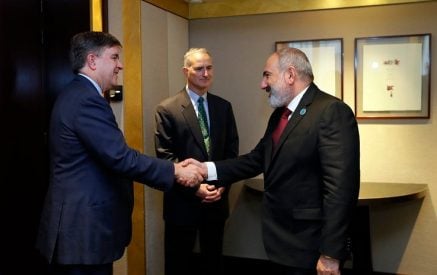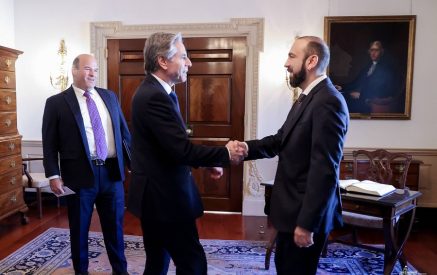The United States has invited the Armenian and Azerbaijani foreign ministers to a NATO summit in Washington scheduled for July 9-11, U.S. Assistant Secretary of State James O’Brien announced during a visit to Baku on Friday.
Azerbaijani news agencies quoted O’Brien as saying that the U.S. expects the two ministers to attend the summit along with representatives of other NATO “partner states.” He did not say whether the U.S. State Department hopes to host fresh peace talks between them on the sidelines of that gathering.
One of those news agencies, Turan, reported on Thursday that Washington is pushing for such talks in hopes of getting Armenia and Azerbaijan to finalize a bilateral peace treaty. The Armenian government declined to comment on the report.
O’Brien held separate talks in Baku with Azerbaijan’s President Ilham Aliyev and Foreign Minister Jeyhun Bayramov. Writing on X after the talks, he said he and Aliyev had a “serious discussion on a range of issues.”
Read also
“The U.S. wants a strong relationship with Azerbaijan. We welcome bold leadership to complete a peace agreement with Armenia without delay,” he said.
“We are very clear with President Aliyev that this is a time to make peace,” O’Brien told U.S. lawmakers ahead of his trip to Azerbaijan.
U.S. Secretary of State Antony Blinken conveyed this message to Aliyev in a phone call last week. Aliyev was reported to reiterate, for his part, that the signing of the peace treaty is conditional on Armenia changing its constitution and other laws which he said contain territorial claims to Azerbaijan. Bayramov reiterated this precondition during his meeting with O’Brien.
Responding to Aliyev’s demands earlier this month, the Armenian Foreign Ministry accused the Azerbaijani leader of “torpedoing the peace process.” Foreign Minister Ararat Mirzoyan on Thursday lamented the lack of a “positive reaction of our Azerbaijani counterparts” to an Armenian proposal to finalize and sign the peace deal within a month.
In a June 12 interview with RFE/RL’s Armenian Service, O’Brien said the deal is important to Washington because it would not only end the Armenian-Azerbaijani conflict but also reduce Russian influence in the region and facilitate a new trade route from Central Asia to Turkey passing through Armenia.
Russian officials regularly claim that the main goal of the U.S. and European Union mediation of Armenian-Azerbaijani negotiations is to drive Russia out of the South Caucasus.


























































